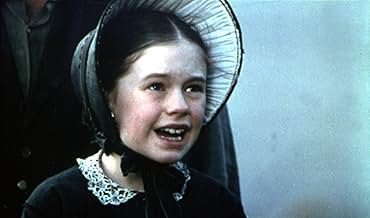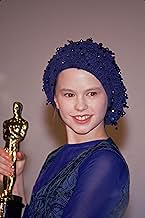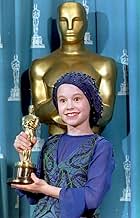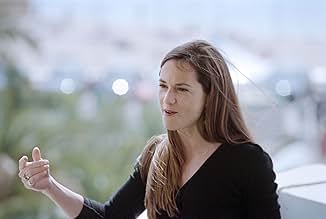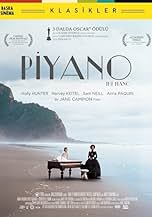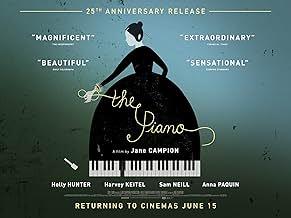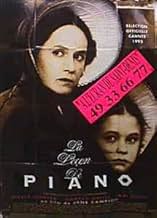In the mid-19th century a mute woman is sent to New Zealand along with her young daughter and prized piano for an arranged marriage to a farmer, but is soon lusted after by a farm worker.In the mid-19th century a mute woman is sent to New Zealand along with her young daughter and prized piano for an arranged marriage to a farmer, but is soon lusted after by a farm worker.In the mid-19th century a mute woman is sent to New Zealand along with her young daughter and prized piano for an arranged marriage to a farmer, but is soon lusted after by a farm worker.
- Won 3 Oscars
- 65 wins & 57 nominations total
- Nessie
- (as Genevieve Lemon)
- Director
- Writer
- All cast & crew
- Production, box office & more at IMDbPro
Featured reviews
I found the story to be less compelling however. It's slow, sparse on dialogue and doesn't give much information about the mute protagonist, like what her wants or fears are. I didn't find her particularly likeable.
There is also the matter of those awful Scottish accents; Why are American actors so bad at accents?
Even less convincing is the love story between Ada (Hunter) and George (Keitel). I felt there was zero chemistry between them; Keitel is such a lump of a man, I don't know why they couldn't have found someone more dashing for the role. His character, George, is so plain and boring, there's nothing about his personality that entices. It seemed silly to me that Ada would allow herself to be persuaded into bed with him, especially when his initial attempts at seduction were so blunt and rape-y. The love scenes left me cold.
It was the visuals and the haunting atmosphere that sustained me to the end. I can see why it gets praise from critics, but I can also see why it wasn't hugely successful with the general public. It just doesn't have the emotional power to match the cinematography.
Australian director Jane Campion's erotically-charged Gothic love story was a huge success back in 1993, winning the Best Actress Academy Award for Holly Hunter and Best Supporting Actress for Paquin, who became the second youngest recipient ever. Hunter's shadowy Ada is the backbone of The Piano, and while it may appear that it is her piano that fuels her passion, it is very much her own mind and experiences that dictate her actions. She is quite a fascinating character - not merely the put-upon mute who longs for love and her piano - she is actually rather subtly manipulative and sexually powerful, weighing up the two love interests in her life, and playing a dangerous power game with her increasingly jealous husband.
The contrast between the two men in Ada's life couldn't be any obvious - Stewart playing dutiful, business-minded and quite inept in courtship, while Baines is hulking, living out in the forest, his face spotted with native Maori tattoos - but it is quite clear as to where Campion's preferences life. Ada's scenes with Baines, in which he listens to her play, become the centrepiece for some highly erotic moments, playing out more like animal foreplay than anything human. Ada seems not to bat an eyelid when Baines lies on the floor by her feet, fingering a hole in her stocking, or simply walks around the room completely naked. While these unconventional actions are there to channel Ada's sexual repression/release and Baines' animalistic nature, these scenes often appear forced, filled with lazy or nonsensical metaphors passed of as spiritual film-making.
As with many Australian period films, The Piano looks stunning. The exotic location is not filmed through a sun-tinted lens, and nor does it capture any of the colourful wildlife (something you would expect if Terence Malick had directed it), but is grey, wet and muddy. Like Peter Weir's Picnic at Hanging Rock (1975) and Gallipoli (1981), it has that lived-in feel, with Hunter's beautiful, ghostly face evoking a 19th- century photograph, where everyone looks grim and pale, and Campion's occasionally snapshot approach captures the mundane, everyday actions of the period. The performances are a revelation, with Hunter and Paquin deserving their accolades, and Keitel proving a formidable presence (I'll not mention the accent). The Piano is personal film-making, but too often the film seems to be striving for that mystical atmosphere rather than actually capturing it, occasionally getting lost amongst Campion's obvious adoration for her protagonist.
www.the-wrath-of-blog.blogspot.com
There are some very sensual scenes and scenes of great danger. There is pain inflicted and selfishness and power. Hollie Hunter rises above it all and makes her way through this quagmire (the rainy muddy jungle in this case), and arises, victorious in her own fashion.
I believe it would be wrong to assume that any of the characters are martyrs in this tragic story, nor would it be right to think Sam Neill's character a villain. You may think this is crazy, but I think the piano itself serves as both a good and bad omen for all that are involved. I would relate it to a "Pandora's box" of sorts, a treasure that exposes all the evil and sin in the world, but which also provides hope as well. The piano is Ada's sounding box, a tool that allows her to escape from a world that does not understand her, but that also threatens her moral compass, removing her from marital conventions and forces her to lose herself.
The performances in "The Piano" are particularly good, especially Holly Hunter's. It is interesting to note that all of Hunter's piano playing in the film is actually Hunter herself performing in front of us. You can visually and aurally feel the mood of Hunter's character through the music she plays. We the audience lose ourselves right along with her, lost upon a sea of music. We see why Keitel becomes enamored by her, and why Neill becomes overcome with jealousy and betrayal. Not many films would allow us to enter the emotions of all three main characters, but this film is truly an exception.
Rarely do we witness real beauty captured on film. "The Piano" is such a visually stunning film, it's almost intoxicating how its atmosphere sweeps across the screen. This landscape is equaled by the performances, bringing understanding and mystery to this wonder. Sometimes symbolism of this nature can be distracting to an audience. "The Piano" dares to follow this symbolic path, and hits a bullseye with full emotional force. Rating: Four stars.
Did you know
- TriviaHolly Hunter learned to play the piano when she was nine years old and played most of the piano sequences herself.
- GoofsPianos of the period portrayed in the film were made almost entirely of wood, no metal framing at all, and the piano would therefore float, not sink.
- Quotes
[first lines]
Ada: The voice you hear is not my speaking voice - -but my mind's voice. I have not spoken since I was six years old. No one knows why - -not even me. My father says it is a dark talent, and the day I take it into my head to stop breathing will be my last. Today he married me to a man I have not yet met. Soon my daughter and I shall join him in his own country. My husband writes that my muteness does not bother him - and hark this! He says, "God loves dumb creatures, so why not I?" 'Twere good he had God's patience, for silence affects everyone in the end. The strange thing is, I don't think myself silent. That is because of my piano. I shall miss it on the journey.
- SoundtracksThe Heart Asks Pleasure First/The Promise
Michael Nyman
- How long is The Piano?Powered by Alexa
Details
- Release date
- Countries of origin
- Official site
- Languages
- Also known as
- El piano
- Filming locations
- Production companies
- See more company credits at IMDbPro
Box office
- Budget
- $7,000,000 (estimated)
- Gross US & Canada
- $40,157,856
- Opening weekend US & Canada
- $151,419
- Nov 14, 1993
- Gross worldwide
- $40,185,766
- Runtime
- 2h 1m(121 min)
- Color
- Sound mix
- Aspect ratio
- 1.85 : 1







